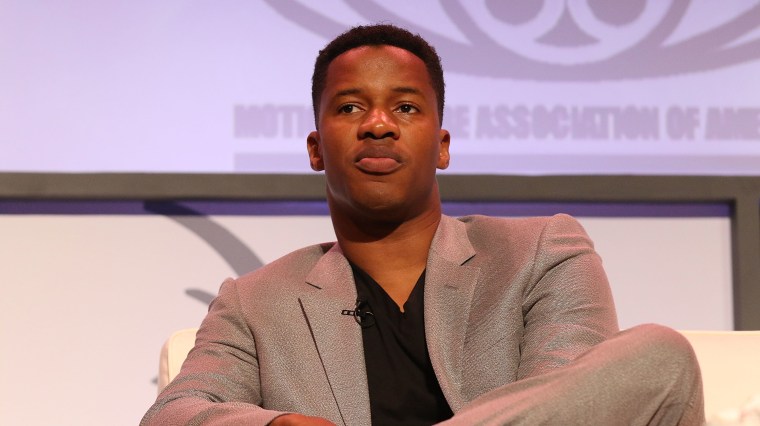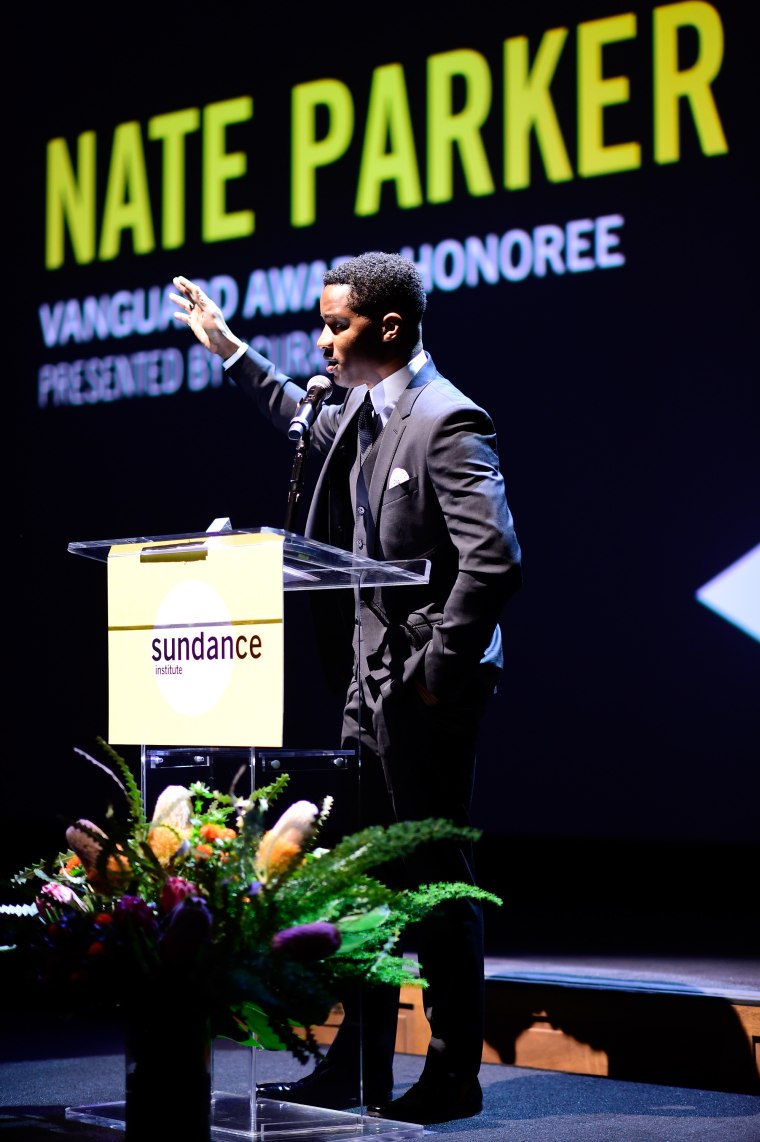
This was supposed to be Nate Parker's year.
The 36-year-old actor's partially self-financed directorial debut in the Nat Turner slavery biopic, "The Birth of a Nation" (which he also co-wrote and stars in), is already an enormous critical success and it emerged from this year's Sundance Film Festival (where is was purchased by Fox Searchlight for a record sum) as very serious Oscar contender.
But an incredibly unfunny thing happened on the way to the Academy Awards. Decades-old allegations of rape against Parker resurfaced, putting both the actor and the studio releasing his purportedly powerful and harrowing film in an awkward position as they prepare for the film's nationwide debut this fall.
In this post-Bill Cosby era, the alleged past misdeeds of celebrities are arguably under a bigger microscope than ever before. In Parker's case, he was exonerated of rape charges in a court of law—but newly released transcripts of conversations between him and his accuser smack of intimidation to some critics and the news that his alleged victim committed suicide four years ago, according to her family, has only added fuel to the fire.
RELATED: Anita Hill Discusses Kerry Washington's New Film Based on Her Story
For his part, Parker, who has always maintained his innocence, has expressed sympathy on social media for the woman who accused him and a classmate, Jean Celestin, (who is also the co-writer of "Birth of a Nation") of assaulting her while she was unconscious when they were all attending Penn State University (which has its own infamous history of alleged sex crimes) in 1999. Parker, who maintained the encounter was consensual, was found not guilty in 2001.
Celestin was convicted and sentenced to six months in prison. Although he won an appeal due to ineffective counsel, the case was not retried because the alleged victim—who would eventually reach a $17,500 settlement with Penn State—declined to testify again, according to The Hollywood Reporter.
While promoting "The Birth of a Nation" Parker has alluded to the accusation and subsequent trial as a "painful" period in his life that he doesn't seek hide, but rise above. Meanwhile, the re-examination of the actor-director's alleged past transgressions has inspired a robust debate about whether the timing of the news is suspicious and, whether he is guilty or not, if his film can be viewed on its own terms any longer.
Parker, who is now married and has five daughters, expanded on the fallout in a lengthy Facebook post writing: "While I maintain my innocence that the encounter was unambiguously consensual, there are things more important than the law. There is morality; no one who calls himself a man of faith should even be in that situation."
"I understand why so many are concerned and rightfully have questions. These issues of a women’s right to be safe and of men and women engaging in healthy relationships are extremely important to talk about, however difficult," he added. "And more personally, as a father, a husband, a brother and man of deep faith, I understand how much confusion and pain this incident has had on so many, most importantly the young woman who was involved."
"I have changed so much since nineteen," he concluded. "I’ve grown and matured in so many ways and still have more learning and growth to do. I have tried to conduct myself in a way that honors my entire community – and will continue to do this to the best of my ability."
One of the unintended consequences of the controversy is that Parker and his film represented a great opportunity for a black director to break into the infamously lily white world of Oscar glory.
Yet many social media users have already called for boycotting Parker's film but, so far, his studio is sticking by him. "Searchlight is aware of the incident that occurred while Nate Parker was at Penn State," they told NBC News in a statement. "We also know that he was found innocent and cleared of all charges. We stand behind Nate and are proud to help bring this important and powerful story to the screen."
Still, Clayton Davis, editor of Awards Circuit, a website which is at the forefront of reporting industry and Oscar buzz, is already predicting that the movie may be yanked from theaters entirely until next year.
"[Nate Parker] was going to do the rounds at college campuses and things like that, and that’s probably going to be flushed down the toilet," he told NBC News. "It's 'The Hunting Ground' all over again," he added in reference to the acclaimed 2015 documentary detailing the campus rape epidemic in America.
Davis thinks that the film's fate still lies in Fox Searchlight's hands. "It depends on what they decide, do they want to take this head on and say 'look he was acquitted, this has nothing do with this film and the film has a powerful message that needs to be heard now in the wake of #OscarsSoWhite,'" he said, "But they can’t have him be the face of the movie now."

One of the unintended consequences of the controversy is that Parker and his film represented a great opportunity for a black director to break into the infamously lily white world of Oscar glory.
"I've never seen something like this occur—the movie has had buzz since January and people have anointed it as the movie of the year," said Davis. "Nate Parker is supposed to be the second coming of African-American filmmakers. ['The Birth of the Nation'] is supposed to be the one and now to have it tainted in such a way is unfortunately going to hurt the progress of people of color in the industry."
In the past, directors who have been either accused of sexual abuse (like Woody Allen, who has vehemently denied allegations) or convicted of sexual assault (Roman Polanski) have been able to weather criticism and win major awards. But Davis believes that in those cases there was enough distance from the allegations and established good will for the filmmakers to trump any trepidation over their personal lives.
RELATED: Cannes Embraces 'Loving', Film on Case That Ended Interracial Marriage Ban
They also, according to Davis, were buoyed by the fact that they are white.
"Hollywood and the public are not forgiving like that to African-American filmmakers," he said, citing polarizing director Spike Lee's lack of awards kudos over the years as an example. "I don’t think the odds are in [Parker's] favor to overcome this."
It likely will not help matters that a rape is depicted in "The Birth of Nation" or that Parker has been accused of showing a tone deaf intolerance towards the LGBT community for allegedly saying he would never play a gay character in order to "preserve" the masculinity of black men.
Parker told Deadline that despite the renewed attention on the case, he wants to move forward and "will not relive that period of my life."
He added, "What I can do, is be the most honorable man I can be. Live my life with the most integrity that I can, stand against injustice everywhere I see it, lead charges against injustice, against people of color, against the LGBT community. That’s me. The black community is my community, the LGBT community too, and the female community. That is my community. That's me, it’s who I am."
Meanwhile, according to Davis, there is reason for audiences hungry for more multicultural representations at the movies and Oscars to see the glass as half full despite Parker's apparent setback. This year is expected to boast a bevvy of awards-caliber films from minority talent—including Denzel Washington's big screen interpretation of "Fences" and director Barry Jenkins' "Moonlight"—which could produce the first black Best Director winner ever.
"No matter what, the academy is going to be looking for representation," he said.
